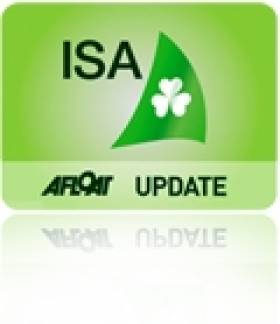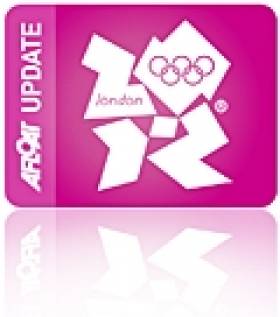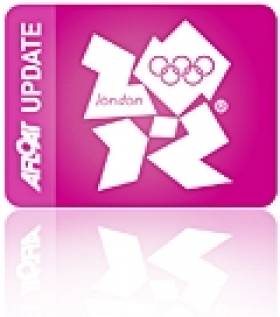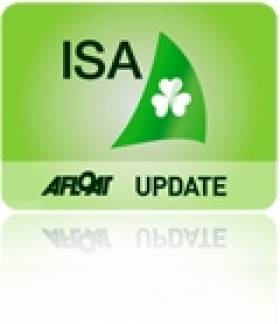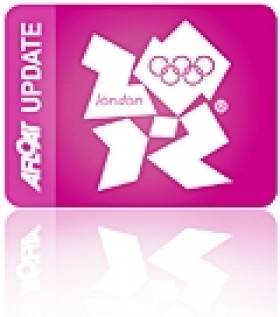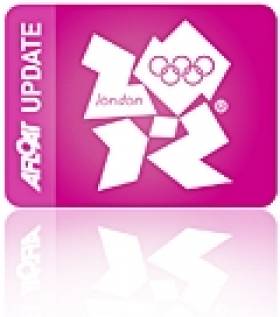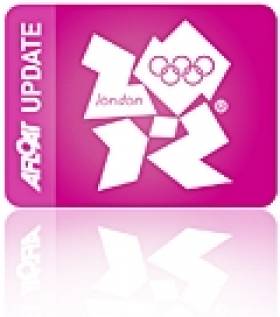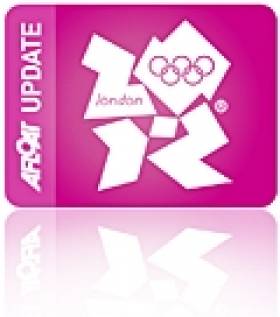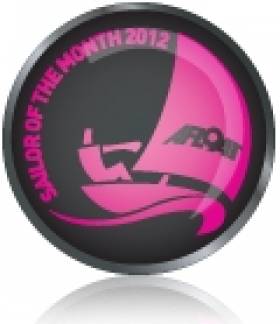Displaying items by tag: Peter O'Leary
Celebrate Irish Sailing At The ISA Awards Ball
#ISA - Supporters of Irish sailing are asked to come together for a night of celebration and pay tribute to some of the outstanding contributors to sailing across six categories including the Mitsubishi Motors Club of the Year, Volunteer of the Year, Instructor of the Year and Training Centre of the Year.
Irish sailing's stars of tomorrow - such as ISAF Youth Worlds silver medallist Finn Lynch - are also in the running for the title of Youth Sailor of the Year.
Last year was an incredibly successful year for Irish sailing: 11 sailors represented Ireland at both the London Olympic and Paralympic Games, dozens of medals were claimed at events around the world and we played host to such high profile events as the ISAF Youth Worlds, the Volvo Ocean Race finale, the Tall Ships Race and the MOD 70s, to name but a few.
The ISA Awards Ball is the occasion to celebrate 12 months of successes and also launch the 2013 season in style. Tickets for the ball are €65 per person and must be booked by Friday 22 February 2013. Full details can be found at the ISA website HERE.
Peter O'Leary and David Burrows
When Peter O'Leary (29) and David Burrows (34) came ashore in Miami last month having taken silver for the second time at the Bacardi Cup, the London Olympic pair showed the depth of their ambition when they left the venue disappointed at not having lifted the prestigious cup.
It moved the Cork-Dublin pairing on from Dublin bay where they won a bronze medal on home waters at the class European championships last September set them up for 12th overall and a ticket to London in Perth last December at the ISAF world championships. They are now ranked in the top five in the world.
Helmsman O'Leary's family continue to be a big influence including one Grandad who won a Bronze sailing medal for Britain at the 1968 Mexico Olympics.
The pair who count six Olympic appearances between them (It is Burrow's fourth Olympics since Atlanta) are banking on an extra turn of speed from a brand new P-Star keelboat they launched in Florida to bring home the medal they are tipped for. It's their only chance for success in the Star as the class is being ditched from the Olympic line up for 2016.
Star Sailor O'Leary Set to Tie The Knot With Olympian Derval
#Olympics - It was a match made in Beijing - and now four years on, Crosshaven sailor Peter 0'Leary and sprint hurdles champion Derval O'Rourke have announced their engagement, as Independent Woman reports.
The Olympian couple are keeping mum for the time being, but it's expected that they will wed in their home county of Cork.
O'Leary and O'Rourke apparently struck up a companionship at the closing ceremony of Beijing 2008, when both were coming down after disappointing Olympic campaigns in their respective sports.
That first conversation quickly blossomed into a relationship that's clearly done no harm to their improving performances on the track and on the water - O'Rourke reaching the 100m hurdles semi-finals, and O'Leary finishing a respectable 10th in the Star with partner David Burrows.
It's also surely a welcome turn of events for O'Leary especially after a stressful few months following London 2012 that culminated in a warning from the International Olympic Committee over his betting on a competitor at the 2008 Games.
IOC chiefs announced last week that they had "no proof of any match fixing" and agreed that O'Leary was at the time not fully aware of the rules against competitors betting on Olympic events.
The Irish Sailing Association (ISA) has hit out at what it called a "malicious campaign" against the Star helmsman, noting that the facts present a very different picture from the story that circulated in the media on the eve of his opening race at Weymouth this summer.
O'Leary Let Off With Warning Over Beijing Bet
#OLYMPICS - Irish Olympic sailor and current All-Ireland sailing champion Peter O'Leary has been let off with a warning by officials after betting on a competitor to win at the 2008 Games in Beijing.
O'Leary and his then partner Stephen Milne did not qualify for the Star class medal race in Beijing, in which O'Leary won €3,600 after placing a €300 bet on 12-1 Britain.
The story came to light days before O'Leary and current teammate David Burrows began their Star class campaign at this summer's London Olympics, prompting an investigation by the International Olympic Committee (IOC).
But IOC chiefs announced yesterday that they had found "no proof of any match-fixing".
While Olympic athletes are banned from betting on Olympic events, the IOC's ethics commission agreed that O'Leary was not fully aware of the rules at the time.
"The athlete was unaware he could not bet on Olympic events," said IOC spokesperson Mark Adams. "It is not something we agree with and we condemn it but we will not take any more action."
O'Leary and Burrows finished 10th in the Star class at the London Games in what was a milestone summer for Irish sailing on world sport's biggest stage.
Baltimore's Peter O'Leary Wins All Ireland Sailing Title
#allireland – London Olympic keelboat representative Peter O'Leary is the new All Ireland sailing champion after a light air series was completed at Dromineer on Lough Derg this afternoon. Cork sailors also filled second and third spots with O'Leary's Baltimore club mate Fionn Lyden, who won the Junior title a fortnight ago, second and Royal Cork's George Kenefick, the defending champion, third.
O'Leary from Baltimore Sailing Club dominated the final three-race series and did not to have to sail the last race but did so anyway. He lifted the Helmsman's Salver for the second time, having first won the title in 2006.
O'Leary who raced under the burgee of Baltimore Sailing Club but who also has close ties with Royal Cork becomes the seventh Cork sailor in a row to win the title. His brother Nicholas being a triple champion from 2008 to 2010.
A total of 24 sailors drawn from a selection of one design and cruiser classes competed for the title. O'Leary was issued with a wild card invitation by the Irish Sailing Association (ISA) following his Olympic regatta participation.
Racing in J80 keelboats, the sixth consecutive time the event was held in the keelboat class, the regatta began with a qualifier round on Friday for eight of the teams with only the top three then making it through to a 16 boat, 2 flight preliminary series on Saturday. The original aim had been for the two separate flights of eight boats to sail three races a piece before a two-race repechage and three-race final series on Sunday. However due to the absence of any wind on Saturday afternoon it was not possible for the second flight to sail any races. Based on the circumstances, the race management team made the decision to forego the repechage in favour of attempting the three-race series for Flight 2 in the morning with the top four boats from each flight progressing to a three-race final series in the afternoon.
Competition in the final series was tight. Amongst the eight helms were three former Olympic sailors including Peter O'Leary and Ryan Seaton who both competed at the 2012 Games and Mark Mansfield who sailed at four consecutive Olympics from 1992 to 2004. Also sailing was reigning champion, George Kenefick who was back to defend his title and the youngest of all the competitors, 17 year old Fionn Lyden who only two weeks ago won the ISA Junior All Ireland Championship in Schull, Co. Cork.
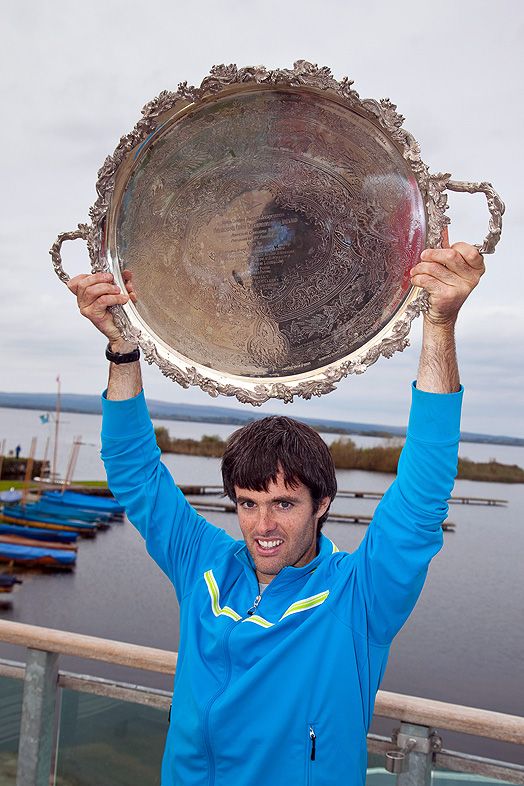
Baltimore's Peter O'Leary holds the original 1947 IYA Salver trophy aloft at Lough Derg this afternoon
The deciding three races began in the early afternoon in winds that steadily grew to 12 knots for the final race. Peter O'Leary, who was sailing with his brother Robert O'Leary and Robbie English, quickly made his presence known by taking the lead and winning the first race. Having been top of the leader board going in to the final, Fionn Lyden and his crew of David Harte and Darragh McCormack slipped to second place overall followed closely by Mark Mansfield in third.
Another race win followed by a second place finish and the title was Peter's. Young Fionn Lyden sailed a magnificent regatta and beat off two Olympians to claim the silver. In third place was last year's winner George Kenefick who clawed his way up from the back of the fleet to win the final race and take the bronze. He finished tied on points with Mansfield but beat him based on a count back; George's best result during the regatta was a first while Mark's was a second.
The final results are below:
|
Helm |
Club |
R 1 |
R 2 |
R 3 |
R 4 |
R 5 |
R 6 |
Pts |
Disc |
Net |
|
Peter O'Leary |
Baltimore SC |
5 |
1 |
2 |
1 |
1 |
2 |
12 |
5 |
7 |
|
Fionn Lyden |
Baltimore SC |
2 |
3 |
1 |
3 |
4 |
3 |
16 |
4 |
12 |
|
George Kennefick |
Royal Cork YC |
1 |
6 |
6 |
5 |
2 |
1 |
21 |
6 |
15 |
|
Mark Mansfield |
Royal Cork YC |
2 |
5 |
3 |
2 |
3 |
8 |
23 |
8 |
15 |
|
Noel Butler |
Dun Laoghaire Motor YC |
3 |
2 |
4 |
4 |
8 |
4 |
25 |
8 |
17 |
|
Ryan Seaton |
Ballyholme YC |
3 |
3 |
1 |
6 |
7 |
7 |
27 |
7 |
20 |
|
David Dickson |
Lough Ree YC |
7 |
1 |
3 |
7 |
6 |
6 |
30 |
7 |
23 |
|
Ian Nagle |
Royal Cork YC |
8 |
2 |
4 |
8 |
5 |
5 |
32 |
8 |
24 |
O'Leary & Burrows Finish Tenth in Final Olympic Star Race
#peteroleary – Peter O'Leary and David Burrows have produced Ireland's top Star class result at the London 2012 Olympics but it will be small consolation for the pair who won gold at the pre-Olympic regatta just six weeks ago.
O'Leary finished 10th in the medal race and 10th overall, eclipsing Mark Mansfield's 12th at the Atlanta Olympics in 1996 also crewed by David Burrows.
The regatta represented the final regatta for the 20 foot design after a 100 year stint as an Olympic class bringing an end the mens keelboat category.
The Cork-Dublin pair were 9th overall beginning the medal race this afternoon but due to their points on the leader board, they were not in contention for a medal.
Sweden's Fredrik Loof and Max Salminen won the Star Medal Race to upset the favourites and take the gold medal.
Having trailed overnight leaders Iain Percy and Andrew Simpson (GBR) by 12 points ahead of the Medal Race the Swedes won by four seconds over Hamish Pepper and Jim Turner to overcome the Brits who finished eighth.
The Brits had to finish sixth or better to guarantee gold but in a tense final run Norway's Eivind Melleby and Petter Morland Pedersen, America's Brian Fatih and Mark Mendelblatt and Brazil's Robert Scheidt and Bruno Prada finished less than two seconds ahead of the Brits squeezing them into eighth and down into silver medal position. The Brazilians subsequently fell into bronze medal position.
Final top three:
1. Fredrik Loof and Max Salminen (SWE) - 32pts
2. Iain Percy and Andrew Simpson (GBR) - 34pts
3. Robert Scheidt and Bruno Prada (BRA) - 40pts
The ISA's James O'Callaghan said "While it is the best result Ireland have achieved in the Star class it is still disappointing. We came here hoping to be fighting for a medal. That plan has not worked out in a way we could have foreseen".
Irish Star Duo 'Disqualified' from Race Seven in Weymouth
#olympic sailing – Peter O'Leary and David Burrows have been disqualified (DSQ) from this morning's race seven of the Star Class Olympic regatta following a protest taken by Denmark's (DEN) Michael Hestbaek over an incident on the water between the Irish and Danish yachts.
According to a notice published by the protest jury tonight O'Leary has been disqualified from the race because he 'failed to give mark-room' to a boat overlapped inside of the Irish boat, breaking rule 18.2(b). The full jury decision is published on the official site here. (Scroll down to read the full jury decision below).
The jury found that during the first rounding of the windward mark, DEN and IRL were sailing on port tack, DEN to windward of IRL, with strong wind, waves and current. When DEN was within two boat lengths from the mark, the two boats luffed in order to tack. Shortly after passing head-to-wind the boats came close to each other. There was contact between the bow of IRL and the starboard quarter of DEN. The boats then bore down to close-hauled on starboard tack and sailed around the mark, with DEN in front. Neither boat was damaged, nor did they do penalty turns according to the jury.
On the water incidents between competing boats are a regular and normal part of sailing competition. A protest is a standard procedure to resolve disputes between competitors under the racing rules of sailing.

O'Leary and Burrows had a strong start in Race 7 this afternoon. Rounding the second mark they were in fourth, ahead of rivals Robert Scheidt and Bruno Prada (BRA) but while the Brazilians progressed to finish third, O'Leary and Burrows slipped back to finish in 9th but tonight this result has been changed to a DSQ.
In race 8 the Irish duo finished seventh.
O'Leary and Burrows now sit 9th overall on 51 points. Leaders Iain Percy and Andrew Simpson (GBR) are on 13 points while the Brazilians in second are on 22 points. The Star class have a final two fleet races tomorrow before the top 10 progress to the double points medal race on Sunday, 5th August.
In the 49er class Ryan Seaton and Matt McGovern, who have been sailing for four consecutive days, put in another solid performance to hold on to their spot as 9th overall on the leader board. They began Race 7 in 16th place but quickly moved up the ranks to finish just outside the top 10 in 11th. Race 8 saw them better themselves further, finishing a respectable 9th, which was enough for them to remain in 9th overall on 61 points. The Australians, Outteridge and Jensen, hold the lead on 24 points followed by Morrison and Rhodes (GBR) on 35 and Burling and Tuke (GBR) on 41. The 49er class will continue to race tomorrow before their well-earned rest day on Saturday.
Today was the long awaited first day of racing for the Irish 470 duo, Ger Owens, sailing at his third Olympics and Scott Flanigan. Flanigan is the youngest of the Irish sailors at just 19. They got off to a solid start holding position in the middle of the 27 boat fleet, working their way up to 15th during the middle of the race. They didn't quite manage to hold on to their spot and slipped back to finished 18th. They didn't fare as well in Race 2 finishing in 25thplace. They will continue sailing tomorrow, beginning the day in 23rd overall.
Today was the rest day for both the Laser Radial and the Laser fleets. Annalise Murphy remains in first overall and James Espey remains in 45th overall. Both classes will resume racing tomorrow.
Racing will continue tomorrow for all classes with a total of 11 races being sailed by Irish competitors. Sailing action starts at 12 noon in Weymouth.
Protest No. 34
Event: Star - Men
Race: 7
Protestor: DEN
Protestee: IRL
Protest details: Rule 18
Description:
Facts found:
Protestor represented by: Michael Hestbaek, protestee represented by Peter O"Leary
Notes on procedure: The protestee questioned validity, as the description of the incident was only a diagram with no text. The Jury found that there was enough information on the protest (time and location of incident, identity of protestor and protestee and diagram) to identify the incident as required by RRS 61.2(b)
During the first rounding of the windward mark, DEN and IRL were sailing on port tack, DEN to windward of IRL, with strong wind, waves and current. When DEN was within two boat lengths from the mark, the two boats luffed in order to tack. Shortly after passing head-to-wind the boats came close to each other. There was contact between the bow of IRL and the starboard quarter of DEN. The boats then bore down to close-hauled on starboard tack and sailed around the mark, with DEN in front. Neither boat was damaged, nor did they do penalty turns.
Conclusion:
By not giving room to tack to DEN overlapped to windward and on the inside of her, IRL failed to give mark-room to a boat overlapped inside of her, breaking rule 18.2(b). She also broke rule 14. DEN broke rule 13 by not keeping clear of IRL when both were subject to rule 13 as she was on IRL"s port side; however she is exonerated under rule 18.5(a). DEN didn"t break rule 14.
Rule(s) applicable:
13,14, 18.2(b), Definiton of mark-room
Decision:
IRL is disqualified from Race 7
Short decision:
IRL DSQ Race 7
Jury:
John Doerr, Francisco Jauregui, David de Vries, Nelson Ilha, Rut Subniran
#olympicsailing – Fancy betting on sailing at the 2012 Olympics? There's some fantastic odds on sailors to win medals as well as a few short ones if you factor in the vagaries of weather and a week long series. We've taken a quick eyeball and here's a selection from Paddy Power Bookmakers.
Star class supremo Robert Scheidt at 6/5 is not a great bet but there are fantastic odds on the defending champion Iain Percy at 5/1. Ireland 's Peter O'Leary at 7/2 is also definitely worth a punt.
In the Laser Radial class Annalise Murphy at 10/1 who goes into action today is worth a ton of money as the forecast is definitely on her side. We all know she is a formdidable force in big winds so the forecast is good for an each way bet. And Gintare Scheidt is excellent odds at 5/1 especially as she is the reigning world champion.
In the 470 the Australian champions are poor odds at 1/12 given there are so many opportunities for screw ups in a week long event. Ireland's Ger Owens is a very long shot at 25/1.
In the 49er the Irish are 25/1 and possibly a good each way bet as they have a superb coach in Ian Barker, 2000 silver medalist and have been on upward trajectory for the last year.
The Australians at 11/10 look like a sure fire thing so not worth a bet, but the British at 8/1 and the Spanish at 13/1 are both amazing odds.
In the Finn Ben Ainslie 8/15 would be your banker with the Danish at 8/5 very short odds but the Dutch 25/1 and the Croatian 11/2 are both good each way bets.
#olympicsailing – In a perfect opening salvo Peter O'Leary and David Burrows are in silver medal position in the Mens keelboat class after two races in testing 16-20 knots winds at Weymouth today.
The Irish pair led both races of the Star class for a time and made a dramatic comeback in race one where they were 14th out of 16 for a time before a 15 degree left hand windshift moved them up from 13th to second, a fantastic opening result for the Irish campaign.
But right now everyone in the Irish camp is mindful that the focus must be very much sailing rather than premature celebrations. After all it's only day one with two gold medallist teams just a few points behind.
After racing Burrows said in terms of wind across the race track there was as much as five knots difference from one side of the course to the other making it essential for success to stay in the strongest breeze, a tough job in shifting winds.
In race two a plucky move nailed a mid line start and some incredible off the line boat speed put O'Leary/Burrows into first place on the opening beat, a position the Irish held until halfway down the first run when class supremos Iain Percy/Andrew Simpson of (GBR) and Robert Scheidt/Bruno Prada (BRA) overhauled them with some blistering downwind pace.
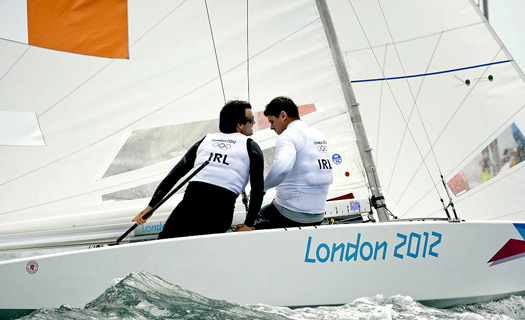
Peter O'Leary and David Burrows (IRL), competing today in the Men's Keelboat (Star) event in The London 2012 Olympic Sailing Competition. Photo: Onedition
A big left hand shift cost O'Leary five places at the second weather mark and put the pair as far back as eighth at one point. The pair fought back strongly though to be sixth by the finish and to put them into second place in the overall regatta standings tonight.
It was a photo finish in Race 2 as Robert Scheidt and Bruno Prada (BRA) overcame Iain Percy and Andrew Simpson (GBR) by the narrowest of margins.
Both teams finished in a time of 73:39 but the race win was awarded to the Brazilians as they took the overall lead having finished fourth in Race 1.
On the race Scheidt said, "We exchanged positions on the second beat, one passing the other all the time and it came down to the finish line. It was a very interesting race. It was so tight that it was hard to see if we won."
Percy and Simpson had a weak start to the competition finishing Race 1 in 11th place but they fought back and almost recorded a bullet in the second place. Simpson said, "It was a tricky race and a good battle at the front. It was very shifty out there and we learnt a few lessons from the first race. We thought we were ahead and it was unbelievably close.
Ireland's David Burrows and Peter O'Leary are second overall after a consistent day that included a second in Race 1 and sixth in Race 2. Meanwhile Mateusz Kusznierewicz and Dominik Zycki (POL) are third overall.
The Star event consists of 10 races and a medal race held between today and Sunday. Race Three gets underway tomorrow at 2.05pm.
Competition at the Games starts for three other Irish sailing campaigns tomorrow with Ryan Seaton and Matt McGovern in the 49er, James Espey in the Laser and Annalise Murphy in the Laser Radial class. Sailing actions starts at 12 noon.
Full results here
Live feeds for racing here
Burrows and O'Leary are June's Sailors of the Month, Bernard Gouy Wins International Award
#sailorofthemonth – The latest Afloat.ie/Irish Independent "Sailor of the Month" awards reflect the hectic pace of sailing at all levels this year, with the Monthly Award going to gold medallists in Olympic campaigning, while the International Award is for a French sailing family with strong connections to Ireland's west coast.
Fortunately, although the overall result in the Volvo Race at Galway is already clearcut with Groupama unbeatable on the leaderboard, today's in-port race will mark the proper conclusion of an event which has confirmed its position as the world's premier offshore contest. So the Volvo racers are July's men, and we can pause for a moment to salute the stars of June.
The Olympics next month will mark the conclusion of a rugged buildup, a continuing story which becomes ever more challenging as the main event nears. But the performance by Peter O'Leary and David Burrows in the preliminary regatta, the Skandia Sail for Gold in June, was outstanding in itself.
In terms of winning, they were always there or thereabouts. And most importantly, they were perfectly poised to make the win move when the opportunity arose. It was a stellar performance, and their Gold Medal, snatched from competition of the calibre of Percy & Simpson of Britain and Scheidt & Prado of Brazil, marked a new high for Irish sailing.
For the first time since its inception in 1980, the biennial Round Ireland Race from Wicklow saw overseas competitors outnumber Irish boats, a reflection of the race's growing international importance. The invasion aroused mixed feelings, with its increased likelihood of a foreign winner. But in the end, the deserved victory by the French-owned Ker 39 Inis Mor was seen as a fine win by one of our own.
With his boat named after the largest of the Aran islands, Bernard Gouy proclaims his enthusiasm for the west of Ireland. The family has a holiday place in Connemara, and race for Clifden Boat Club. But they're also regular performers at the front of the fleet in RORC events in the English Channel, and Inis Mor will be expected to turn out for France in the Commodore's Cup at the end of this month.
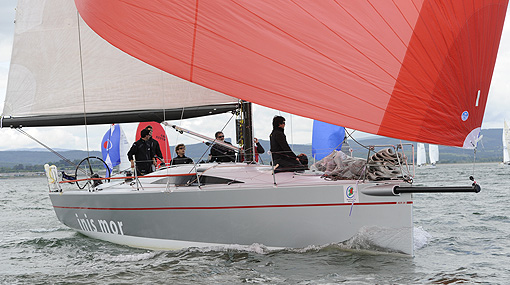
Bernard Gouy's Round Ireland winner Inismor, the winner of Afloat's International Sailor of the month award. Photo: Bob Bateman
However, their commitment to the Round Ireland race is nothing new. Before commissioning the present Inis Mor from designer Jason Ker, they campaigned a standard 40ft Jeanneau cruiser-racer and got into the frame. Their Round Ireland victory last weekend was the result of exemplary sailing and tactics throughout a very challenging race. It was textbook stuff, and we salute our International Award winners for showing the way.



























